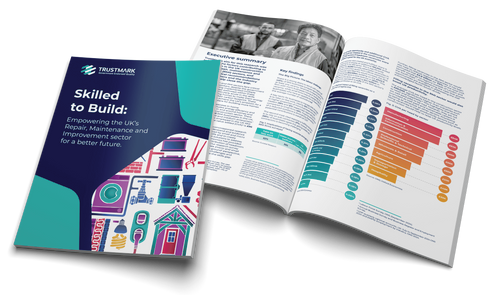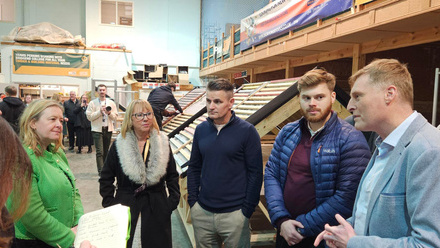Skilled to build: Securing the future of the RMI sector
It is widely recognised that the UK faces a significant shortage of skilled tradespeople, alongside a gap in the expertise needed to meet the country’s Net Zero ambitions and its plans for delivering new homes. This shortfall is particularly acute in the skills required to improve existing homes to make them more energy efficient and to lower their carbon footprint.

In this article, Simon Ayers MBE, CEO of TrustMark, shares highlights from a recent report published by TrustMark, titled Skilled to Build, and examines Repair, Maintenance and Improvement (RMI) sector, with a particular focus on the small and micro businesses that operate within it. It also explores the challenges they face around recruitment, training and funding, both in terms of people and knowledge, and offers practical, actionable recommendations to address the gaps, drive change, and help build a skilled and competent workforce.
The research, commissioned from Eureka! Research with economic analysis from Oxford Economics, draws on evidence gathered from over 1,200 small and micro businesses. This offers an authentic ‘on the ground’ view of the challenges these businesses encounter, and provides comprehensive solutions to help tackle the skills shortfall.
An ageing workforce and shrinking pipeline
The findings are stark: 44% of the RMI workforce is aged 55 or over, and a quarter of those plan to retire or semi-retire within three years. Without urgent action, an estimated 39,000 businesses could disappear from the sector within the next decade, further worsening the skills crisis. Encouragingly, 55% of business owners nearing retirement have expressed willingness to mentor, train, or help shape the next generation of workers, providing a valuable opportunity
Meanwhile, TrustMark estimates that closing this workforce gap could unlock an additional 195,000 skilled roles and contribute £4.1 billion in gross value added (GVA) to the UK economy. This highlights not only the scale of the challenge, but also the opportunity.
Recruitment vacancies hampering progress
One of the key findings reveals a strong appetite among micro and small businesses to hire, with nearly half (45%) reporting at least one vacancy. Recruitment, rather than retention, emerged as the primary hurdle.
The shortage of skilled workers is hampering the UK’s RMI sector, slowing progress towards net zero goals, and threatening the long-term stability of thousands of small firms. Many businesses have had to turn down work, with over half (52%) scaling back due to staff shortages. Reliance on subcontractors has become a common workaround (used by 37%), but even this solution is under pressure, with 56% reporting difficulty in finding reliable subcontractors.
Structural barriers to growth
While retention isn’t seen as a major issue, recruitment remains difficult. Many businesses report avoiding formal training routes for fear that upskilled workers may be poached by competitors. Others cite challenges navigating available funding, a lack of financial support, and limited promotion of RMI careers in schools and colleges.
There’s also a persistent misconception that roofing and other skilled trades are inherently unsafe or unappealing. An image problem that prevents new talent from entering the pipeline.
A call to industry and government
TrustMark is committed to helping address the chronic skills shortages facing the construction and RMI sectors. With demand for skilled professionals rising and the retirement cliff approaching, collaborative action is critical with government and industry to strengthen current infrastructure and build a resilient and long-term competent and skilled workforce. TrustMark’s research provides a roadmap to rebuild the sector’s skills base.
To help drive this national campaign, TrustMark has proposed four key recommendations:
- Develop and deliver fit-for-purpose training and curricula that reflect modern business and technological needs.
- Improve systems that connect businesses with talent, making it easier to recruit and access training.
- Promote and simplify access to financial incentives that support upskilling and apprenticeships.
- Support training in renewables and clean heat technologies, aligning workforce development with the UK’s Net Zero goals.
Simon Ayers MBE, CEO of TrustMark, concludes: “Our research found a strong desire for growth within the RMI sector but these businesses need support to help make that happen. Our report provides not only their view of the challenges they face along with what they need to overcome them, but recommendations for what and how that can be done. This sector needs to be prioritised and by working collaboratively across it, the wider industry, associated organisations and government, we can all help to achieve warmer, more comfortable and healthier homes for the UK.”
Follow this link to read the full TrustMark report.


